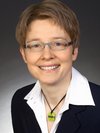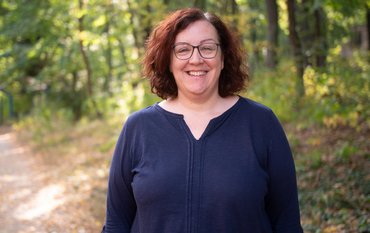Liane G. Benning, Head of Section 3.5 Interfacial Geochemistry, was re-elected as member of the Review Board for Mineralogy, Petrology and Geochemistry for the 2024-2028 term of office. With 277 votes, she achieved the strongest result in this subject. She is then the only representative of the GFZ in the DFG (German Research Foundation) review boards.
In the past two terms, Magdalena Scheck-Wenderoth, Director of Department 4 “Geosystems” and Professor at RWTH Aachen University, was a member of the “Geology and Palaeontology” review board. From 2012 to 2020, Monika Koch-Müller, Head of Section 3.6 “Chemistry and Physics of Earth Materials” until 2022, Professor at TU Berlin and now retired, was a member of the “Geochemistry, Mineralogy and Crystallography” review board. Another current high-ranking representative of the GFZ at the DFG is Charlotte Krawczyk, Head of Section 2.2 “Geophysical Imaging” and Professor at TU Berlin, who was elected to the DFG's 39-member Senate in 2020, where she represents the “Geosciences of the Earth's Body”.
Task of the review boards
The DFG review boards are elected for a term of four years. They are an important part of research self-governance, particularly for the distribution of research funds by the DFG. Their members review, evaluate and decide on funding proposals to the DFG in their respective subject area: They compare all the proposals they have been allocated to identify the most eligible projects within the defined financial conditions. This ensures that the proposals are evaluated according to unified criteria external to the DFG programme. In addition, the review board members further develop DFG funding programmes and discuss funding policy issues.
Election of review boards and increased proportion of women
Around 150,000 academics with a doctorate, working in scientific or academic research, are entitled to elect at least two representatives for each subject every four years. The exact number of representatives depends on how many funding proposals are received by the DFG in the respective subject area.
Between 23 October and 20 November 2023, a total of 54,068 academics voted online to fill 649 places on a total of 49 review boards. Each person could cast up to six votes. A total of 1631 candidates stood for election for the term of office from 2024 to 2028.
The newly elected review boards will begin their work at the constituent meeting, which will take place in spring 2024.
One result of the election, as the DFG emphasised in its press release, is the renewed increase in the proportion of women: the percentage of elected review board members who are female is 37.9, compared to 32.1 percent in the 2019 election.
The DFG Senate
The DFG Senate advises and decides on all DFG matters of major importance within the framework of the principles adopted by the General Assembly. It is thus responsible for all major decisions in research funding prior to the actual funding decision, as well as for all major decisions regarding the design of the review, evaluation and decision-making process. The Senate also decides which Review Boards are to be formed and how they are structured. The Senate has a total of 39 members.
About the person
Prof. Liane Benning is a geochemist and, after working in Switzerland, the USA and the United Kingdom, has been head of Section 3.5 Interface Geochemistry at the GFZ since 2014. She has also been Professor of Interface Geochemistry at the Freie Universität Berlin since 2016.
In her current main project DEEP PURPLE, funded by an ERC Synergy Grant from the European Research Council, she is investigating the physical and microbial processes that are darkening the Greenland ice sheet and accelerating ice melt and sea level rise.
(With text from the DFG)
(Supplemented on 12 January 2024)












![[Translate to English:] [Translate to English:] Abror Gafurov von dem Schriftzug "Welcome to Azerbaijan" und den UN und COP Logos](/fileadmin/_processed_/2/5/csm_2024_11_Baku_COP29_Abror_Gafurov_1042faec82.jpeg)


![[Translate to English:] Martin Herold standing in front of the library on the Telegrafenberg](/fileadmin/_processed_/c/d/csm_Martin_Herold_d385ee4dd9.jpeg)
![[Translate to English:] Many people are listening to a presentation in the GFZ lecture hall.](/fileadmin/_processed_/c/a/csm_1_Bild1_hell_b9c0e9f5ed.jpeg)






![[Translate to English:] Both scientists sitting on stools in front of a wall of books in the Telegrafenberg library](/fileadmin/_processed_/6/6/csm_Buiter_Castell_DORA_4_e87cb1ea18.jpeg)
![[Translate to English:] Gruppenbild mit 4 Personen](/fileadmin/_processed_/8/d/csm_20241017_GFZ-Emmerman-Medal-005_web_reinhardtundsommer_21a414fa4a.jpeg)






![[Translate to English:] Ice landscape with five red tents](/fileadmin/_processed_/8/9/csm_Zeltlager_auf_dem_Eis_Urheberin_Jenine_McCutcheon_5ced2d523b.jpeg)


